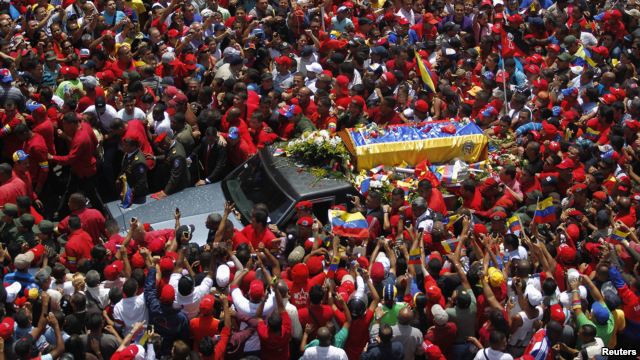 Crowds of grieving Venezuelans sobbed and threw flowers as his coffin made its way through the streets of Caracas Wednesday. A somber Vice President Nicolas Maduro, Chavez’s hand-picked successor, walked next to the hearse.
Crowds of grieving Venezuelans sobbed and threw flowers as his coffin made its way through the streets of Caracas Wednesday. A somber Vice President Nicolas Maduro, Chavez’s hand-picked successor, walked next to the hearse.
Chavez died Tuesday of cancer. He was 58-years-old.
Several close Chavez allies, including the presidents of Argentina, Bolivia and Uruguay, already are in Venezuela for Friday’s funeral.
The United Nations Security Council held a moment of silence Wednesday for Chavez. Cuba, home of Chavez’s mentor Fidel Castro, is observing two days of official mourning. Chinese and Iranian leaders also expressed their sorrow.
The U.S. Embassy in Caracas is closed until after the funeral. The U.S. delegation to the funeral has not yet been announced. President Barack Obama said he reaffirms his support for the Venezuelan people and is committed to polices promoting democracy and human rights.
Chavez, a staunch socialist, was elected president in 1998. He earned the enmity of the United States and others for such policies as nationalizing major companies and courting world leaders such as Fidel Castro, Iran’s Mahmoud Ahmadinejad and Libya’s Moammar Gadhafi.
The country’s opposition accused him of being a dictator. But millions of poor Venezuelans revered him for using the country’s vast oil wealth to give them access to low-cost food, free medical care and other social programs. However, experts say Chavez failed to control crime or use oil wealth to enrich the overall economy.
- Venezuela marks seven days of mourning
- Chavez lies in state at a military academy in Caracas
- His funeral has been scheduled for Friday
- Vice President Nicolas Maduro leads the country until elections take place
- Elections are expected within a month
Nicolas Maduro, Venezuelan VP:
“We now have to be united more than ever with major discipline and collaboration,” he said. “We are going to grow. We are going to be dignified, inheritors and children of a great man. He was and will always be Comandante Hugo Chavez. Glory and honor Comandante Hugo Chavez. Long live Chavez!”
Latin America analyst Sean Burges, Australian Center for Latin American Studies:
“It’s definitely going to be the economy. Nobody knows what’s going on with the oil company and how much it’s producing,” he said. “There are balance payments problems. There are production problems. There are supply problems. And these are all things that even if Chavez had stayed in power, he was going to have to deal with in the next four years. So it’s going to be a really titanic exercise in economic management and rationalization.”
“Irrespective of what happens, I think some of the social policies and the political, dynamic changes Chavez brought in, those are going to be around forever.”
VOA America















